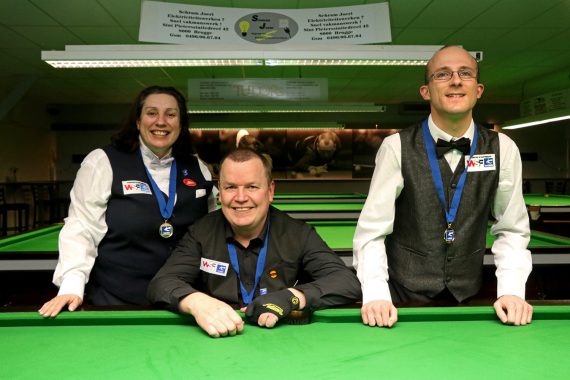Phil Woodwiss Q&A
Among the players who will be competing at this weekend’s Belgian Open will be Skipton’s Phil Woodwiss, who first joined the WDBS circuit approximately 18 months ago and has become a regular on tour.
We recently caught up with the former Open Disability Championship semi-finalist ahead of his return to Bruges to discuss the upcoming tournament, the benefits of playing snooker to him and how important the social aspects of WDBS events are…
Hi Phil, this week we are preparing to return to Bruges for the third staging of the WDBS Belgian Open. How much are you looking forward to returning to the event, having made the trip previously in 2019?
I am very excited to be going back to Bruges. It’s a beautiful place to visit and hopefully I’ll get to see a bit more of it this time.
The Trickshot club we play at is a fantastic venue and we are certainly well looked after all the time while we are there by Olivier [Vandenbohede] and his staff.
Last year you reached the final of the Challenge Cup in Belgium, how happy are you with your game 12 months on?
It’s been a frustrating time; my form has been shocking, hardly winning any matches in the local league or at any WDBS events. However, I seemed to have turned a corner being able to practice more with top quality conditions and players at my friend John’s pub The Crossroads Inn in Keighley, West Yorkshire. So, I am aiming to do well in the event in Bruges.
It has been approximately 18 months since you joined us at the 2018 Welsh Open for your first WDBS event. How much have you enjoyed competing on the circuit to date?
It’s just like being a professional; I love it, each event is different wearing a smart suit, with referees, meetings with the Tournament Director each day before the start of play and even signing the report sheet after each match. Although my request for extra ‘pockets’ on the table in the comments section has yet to be answered!
What have been your highlights on tour during your time with us so far?
I would say the highlight so far was playing in Belgium last year for the first time. I had always in the past wanted to play in a snooker tournament abroad, so doing it together with my fellow WDBS players was great and hopefully we will play in other countries around the world in the future.
How did you first get into snooker?
One of my friends gave me a 3ft snooker table that he was going to throw away. I began to play on that, not really knowing what I was doing but just learning to pot the balls until I got the chance to play on a proper full size snooker table at a local snooker centre in my home town of Keighley when I was 15 years old.
How does your disability affect your snooker and how challenging has it been returning to the baize? Was there a time you thought that you might not play again?
I no longer move around as quickly as I once did, which can be frustrating at times, as I was a quick player and I have lost the flexibility when positioning myself for certain shots. I now use a small extension which screws into the butt of my cue which many players use, which means I don’t have to position myself across the table awkwardly like I used to do before my disability.
Yes, it was quite scary to think I would not play again. As it wasn’t known until after surgery, how I would walk or if at all. To be able to play again after becoming disabled was a great relief and surprise.
How do you feel that playing snooker as an activity can be of benefit to people with a disability?
Snooker is a game everyone can play at all levels of disability. Whatever disability you have you can find a way of adapting yourself with the use of aids to be able to play. It’s great fun as well with learning new skills on a snooker table. You get a great sense of achievement when you see improvements in your game over time. It also helps to take your mind off other things like the many doctors and hospital appointments and gives you something to look forward to.
As well as playing snooker, how important is the social side of these events to you?
To me it’s a very important part of any event. You don’t always have much time during a match or tournament to chat with many people, so when you go out for a meal with several other players and partners, carers or friends you get chance to get to know people.
You have made a number of friends on the circuit including the likes of Nigel Brasier and Dean Simmons, how much would you encourage other players to get together like this?
I would say at each event, go out at least one night with other players for a meal. It helps develop social skills like chatting to people, making new friends and also builds confidence, which all helps to develop trust in others, so that in the future we feel comfortable travelling in groups to WDBS events, especially as we look to play more events abroad.
It also helps to build self-belief and confidence to deal with our daily lives away from snooker events.
What advice would you have for people with disabilities who might be considering entering a WDBS event?
Don’t be afraid – come and have a go! We have all started where we couldn’t pot a ball. Everyone is so friendly and welcoming, just like one big family is how I would describe the WDBS tour. You will make friendships that will last a lifetime.





